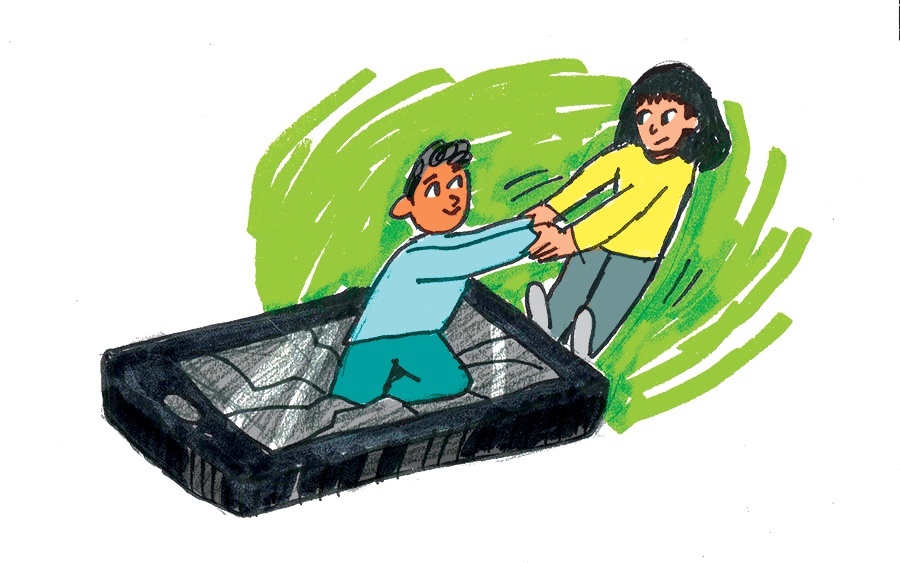
Does your mobile device have your attention gripped in a chokehold? Are you sputtering, attempting to breathe the air of the real world? Perhaps that’s why you picked up this anachronistic stack of newsprint in the year 2024.
For a few years now, I have been on a personal quest to minimize the precious hours of my life spent looking into my phone screen. It has been no easy journey. The scores of people who are paid handsomely to make our phones as addictive as possible are doing a bang-up job. It takes a lot of conscious effort to rewire our brains into new habits, which is exactly what this is all about. So expect successes and failures – but keep at it. It’s all part of the quest. That said, here is what has worked well for me.
SILENCE NOTIFICATIONS AND GET ACQUAINTED WITH “DO NOT DISTURB”
The only notifications I get are texts and calls. From 8pm – 7am, my phone is in “Do Not Disturb” mode. The only people whose messages I get overnight are from my mom and my husband. Everybody else can wait until the next day to hear back from me. If you are worried about true nighttime emergencies, you can adjust the settings to allow multiple calls from the same person to come through.
TURN ON BLACK-AND-WHITE MODE
This is a tip I learned from Johann Hari’s Stolen Focus: Why You Can’t Pay Attention – and How to Think Deeply Again. Our eyes are drawn to bright, highly contrasting colors. Tech designers have taken advantage of this evolutionary feature by making app icons and interfaces extremely bright and colorful. When your glowing rectangle is showing image after image more vibrant than, say, the blue sky behind the screen, it’s no wonder it’s so hard to pull your gaze away. But try opening your favorite photo-sharing app with your screen in black-and-white. Boring! Who cares! This alone has made picking up my phone much less tempting.
BANISH YOUR PHONE FROM THE BEDROOM
Do you find yourself reaching for your phone as soon as your eyes open to greet the new day? Is it the last thing you touch before you fall asleep at night? Setting a physical boundary helps to break this pesky habit. As you get ready for bed, make it part of your routine to tuck your device away in another room. If you use your phone as an alarm, you might want to pick up an inexpensive (or expensive – you’re worth it!) alarm clock.
GIVE SOME THOUGHT TO WHAT YOU ARE REALLY SEEKING WHEN YOU PICK UP YOUR PHONE
I realized I was spending so much time on social media with the hope that someone would share an interesting article, or that I would get a message from a friend. With this realization, I was enabled to seek these things proactively, rather than just scrolling and hoping. Two hours of social media could now be replaced with an hour of reading an interesting book of my choosing, and an hour of calling a friend to catch up or making plans to get together.
TRY A TECH SABBATH
Tiffany Shlain’s 24/6: The Power of Unplugging One Day a Week details the concept. Drawing from the Jewish practice of Shabbat, a sacred day of rest, Shlain offers an opportunity to give yourself one day a week away from the ubiquity of screens. For me, Saturdays spent without use of my phone or computer are such a respite. Much of daily life with our tech involves taking in enormous amounts of other people’s thoughts, so it’s revitalizing to let my own thoughts run wild and free. If devoting a full day every week sounds like too much, start small. Try a tech-free evening, or a monthly screen-free day.
GIVE YOURSELF GRACE
Unless you plan on hurling your device into the Narragansett Bay, you will have to find a satisfying way to live alongside smartphones. Since there is so much money invested in making them addictive, you won’t always be able to win that battle. That’s okay. Ultimately, it should not be up to us as individuals to fight multi-million-dollar tech behemoths in their efforts to siphon your money and life force. We should be getting together as citizens to call for regulation of the tech industry. In the meantime, don’t be too hard on yourself when you grab your phone to watch some cute videos of a monkey petting a stray cat. We’re only human.